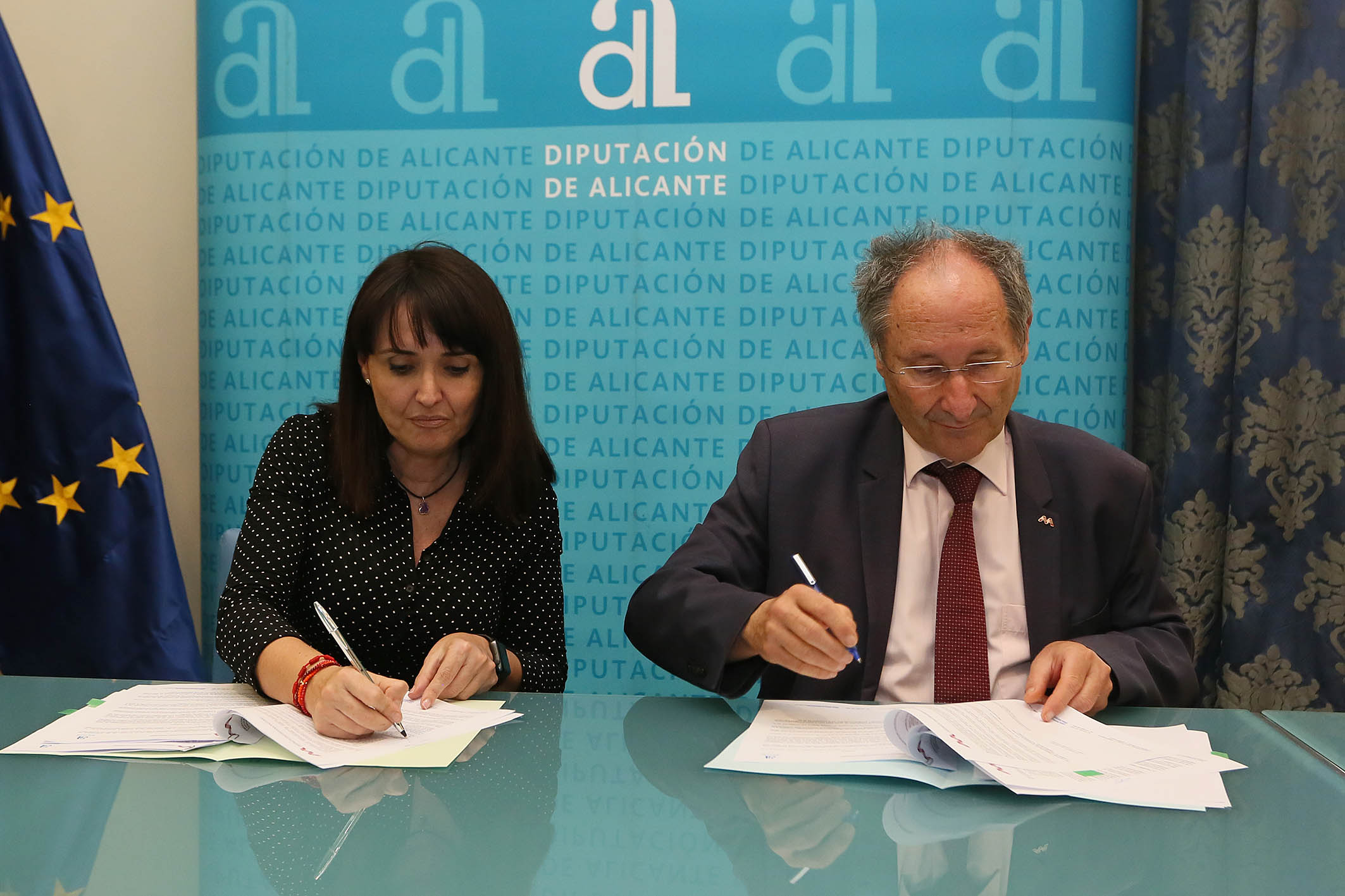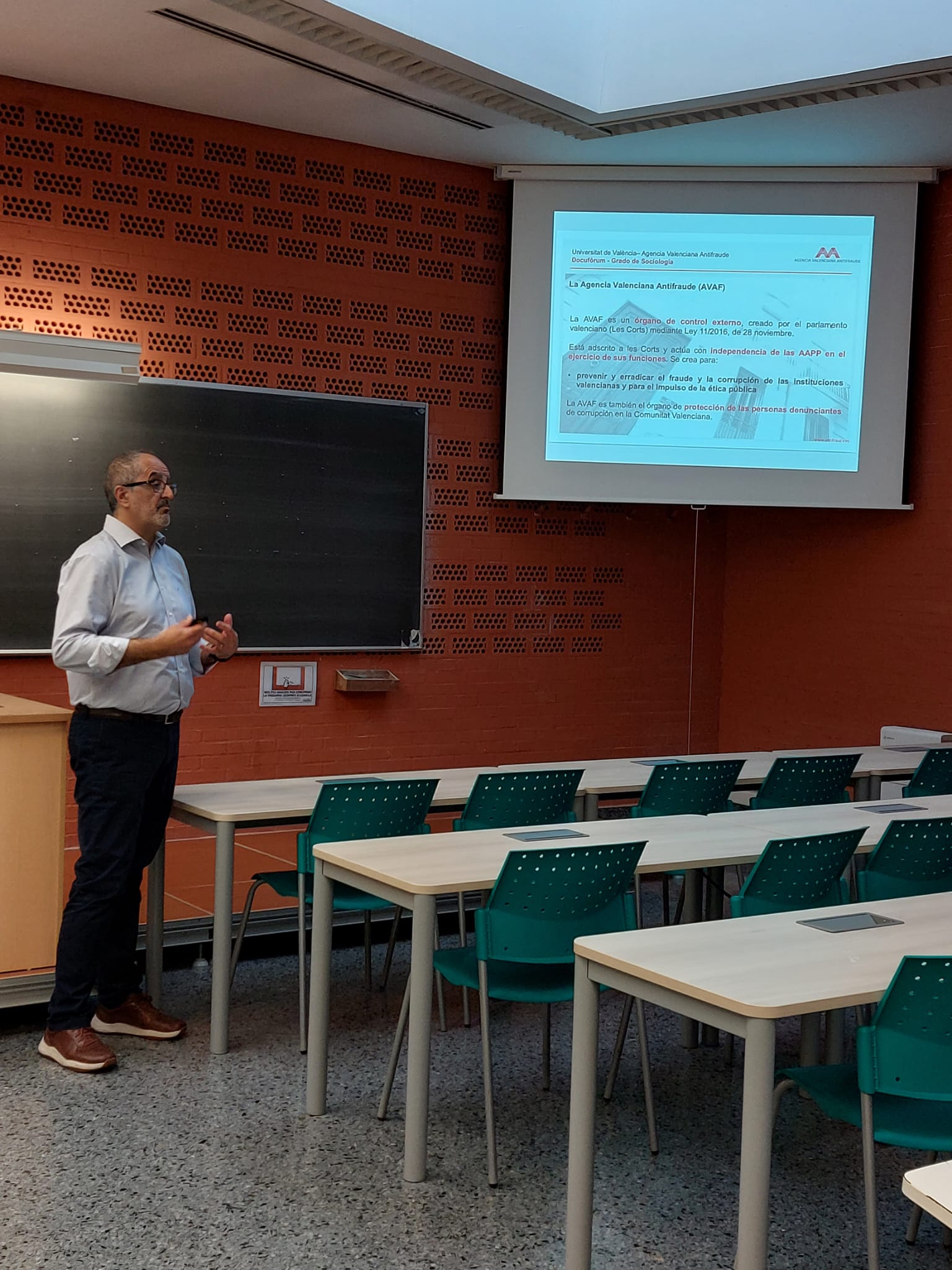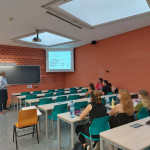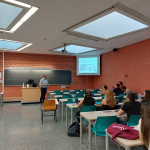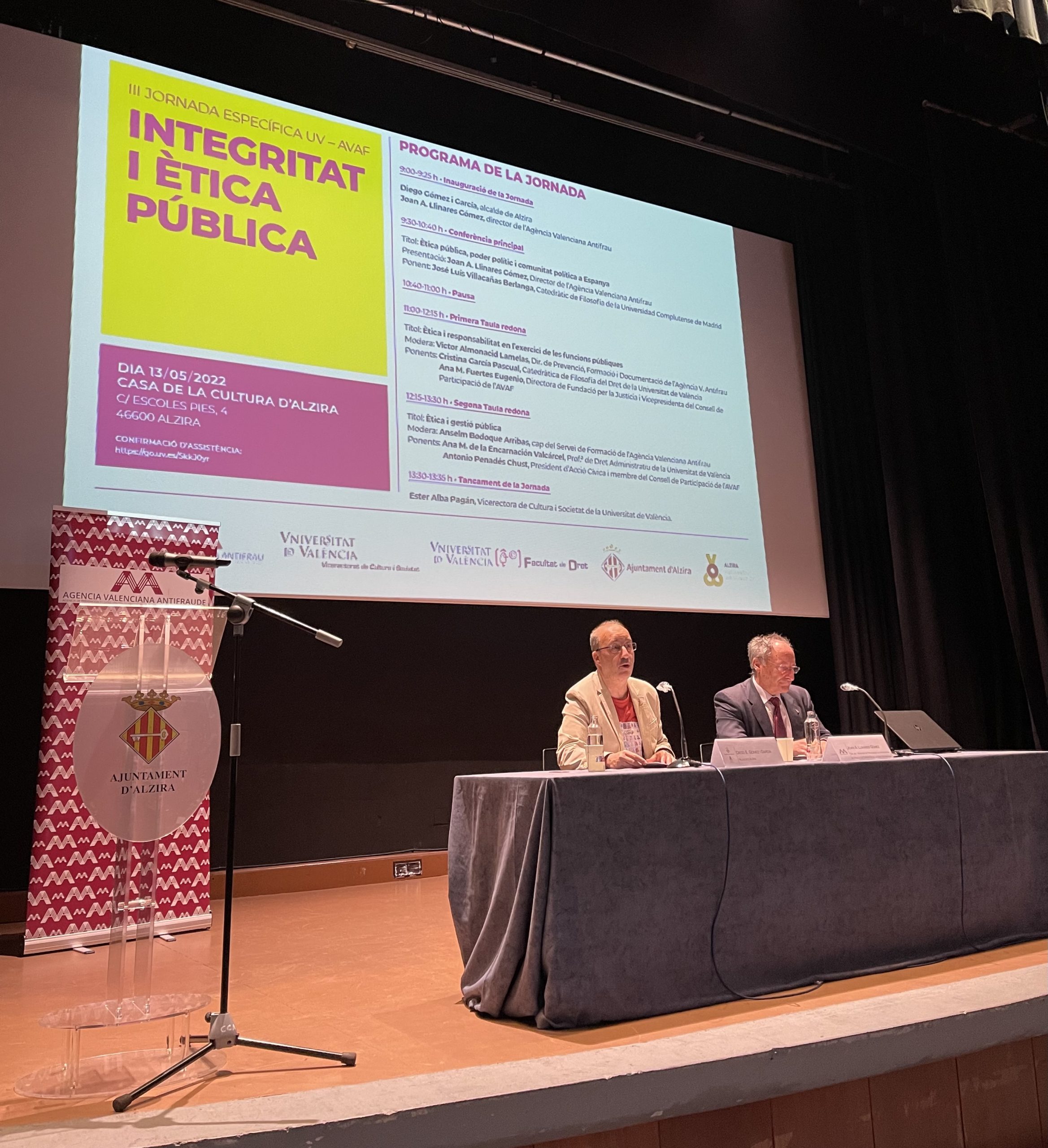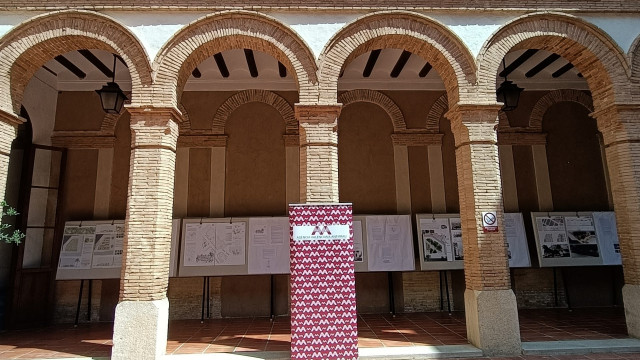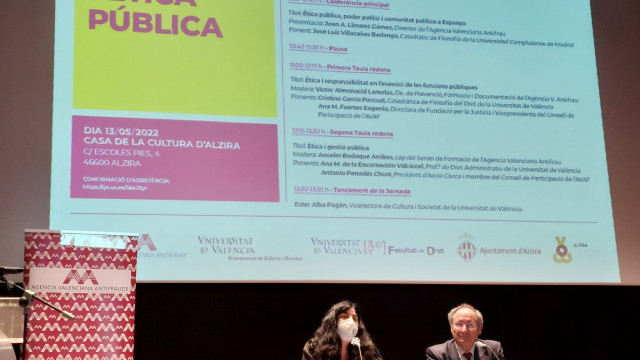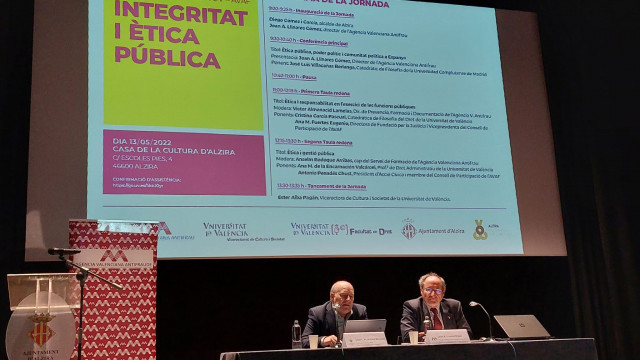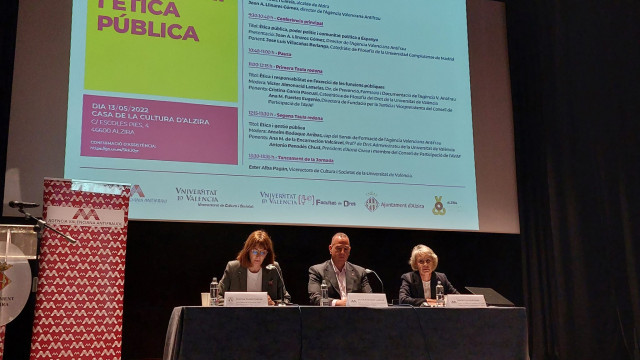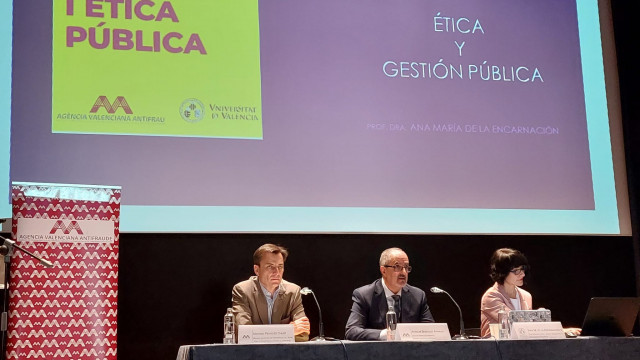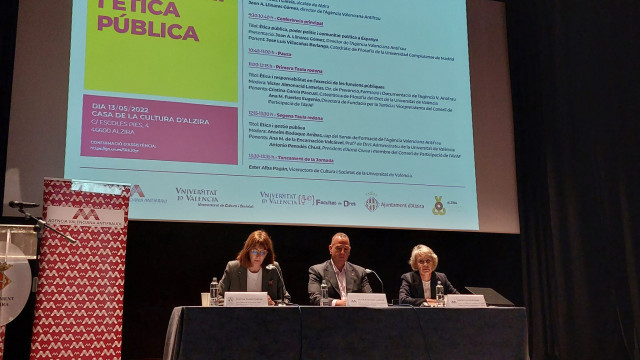#TrainingAVAF
The Alzira House of Culture hosted the 3rd UV-AVAF Specific Conference, under the theme of “Public Integrity and Ethics”. The conference was held within the framework of the collaboration agreement signed between the Vice-rectorate for Territorial Projection and Society and today assumed by the Vice-rectorate for Culture and Society of the University of Valencia, with the collaboration of the Faculty of Law and the Alzira City Council.
It was opened by the mayor of Alzira, Diego Gómez García, and the director of the Valencian Anti-Fraud Agency, Joan Llinares, who thanked the institutional collaboration of both the Alzira town council and the University of Valencia, which from prevention have made possible programs such as the of this day. He also thanked the availability and participation of Professor Villacañas and the rest of the speakers.
The main conference on “Corruption: a philosophical approach” was given by the Professor of Philosophy at the Complutense University of Madrid, José Luis Villacañas Berlanga, accompanied at the table by Joan Llinares, director of the AVAF. Professor Villacañas started from philosophy to understand corruption, the fight against fraud and the control of actors endowed with power, and from this understanding generate common energies capable of repairing the world of shared life.
Corruption, far from being an opportunistic and circumstantial element in human action, can become systemic. It is precisely its expansive, invasive, totalizing and systemic aspect that must be explained in its essential elements.
Professor Villacañas explained what he calls the republican principle as the domain of the law, as an organizational principle intended to break the continuity of the holders of power in societies that make corruption normal, not recognizing autonomy and difference of the specific spaces of social life such as economic and political.
He concluded his presentation indicating that the indispensable condition to win the battle against corruption is the community of free men publicly linked to permanent institutions that do not allow themselves to be dominated, who fight for a way of living with dignity and cleanliness.
We invite you to listen to the conference at this link, as well as a short interview that was conducted on the same day.
In the first round table on ethics and responsibility in the exercise of public functions, the moderator was Víctor Almonacid, director of Prevention, Training and Documentation of the Valencian Anti-Fraud Agency. The Professor of Philosophy of Law at the University of Valencia, Cristina García Pascual, began her speech by raising the need for ethical behavior and responsibility, following Hans Jonas in the principle of responsibility. He went on to point out four forms of non-compliance with good public service to illustrate the complexity of the issue and the need to promote appropriate strategies from the institutions to minimize irresponsible actions.
For her part, the director of the Foundation for Justice and vice-president of the Agency’s Participation Council, Ana María Fuertes Eugenio, based her speech on different studies on corruption, such as the one carried out by the IVIE, as well as other projects such as the Pact against Corruption and its evaluation, to show how organized civil society initiatives are taken to control and monitor political commitments in order to promote citizen trust in institutions.
The second table, moderated by Anselm Bodoque, head of the Agency’s Training Service, on ethics and public management, included the participation of Ana M. de la Encarnación Valcárcel, professor of Administrative Law at the University of Valencia, and Antonio Penadés Chust, President of Civic Action against Corruption and member of the Agency’s Participation Council.
Professor Ana M. de la Encarnación focused her presentation on ethics in public management, starting from some nonsense that can occur in practice, questioning ethics in the processes of access to the public function, performance ethics, as well as such as the acceptance of gifts. In the reflection, he relied on the code of conduct for public employees integrated in some articles of the EBEP.
For his part, Antonio Penadés emphasized the concept of general interest, referring to those actions that, being legal, do not respond to the general interest. And remembering the importance of institutions for citizenship. On the other hand, he pointed out the difficulty of support judges in large cases with very extensive summaries, to insist on the need for specialized courts.
The conference closed in Alzira with Ester Alba Pagán, Vice-Rector for Culture and Society of the University of Valencia. The Vice Chancellor thanked the possibility of carrying out activities such as this one, given that the University is a bearer of knowledge and values. He highlighted the value of the synergies of the different institutions and the academic reflection that the University contributes to society through activities such as this conference.
For his part, Joan Llinares thanked the necessary institutional collaboration to make possible conferences such as the one held in Alzira and raise awareness, from an academic discourse, of the necessary fight against corruption.
 Conference: “Corruption, a philosophical approach”. Mr. Jose Luis Villacañas Berlanga
Conference: “Corruption, a philosophical approach”. Mr. Jose Luis Villacañas Berlanga


